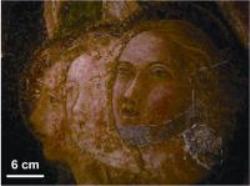Feb 25 2010
A laser technique best known for its use to remove unwanted tattoos from the skin is finding a second life in preserving great sculptures, paintings and other works of art, according to an article in ACS' monthly journal, Accounts of Chemical Research. The technique, called laser ablation, involves removing material from a solid surface by vaporizing the material with a laser beam.
 Art conservationists cleaned the two angels on the left with traditional restoration methods. They cleaned the one on the right using an advanced laser technique, which produced better results
Art conservationists cleaned the two angels on the left with traditional restoration methods. They cleaned the one on the right using an advanced laser technique, which produced better results
Salvatore Siano and Renzo Salimbeni point out that laser cleaning of artworks actually began about 10 years before the better known medical and industrial applications of the technique. Doctors, for example, use laser ablation in medicine to remove unwanted tattoos from the skin. In industry, the technique can remove paints, coatings and other material without damaging the underlying surface.
In the article, the scientists note that laser ablation has had an important impact in preserving the world's cultural heritage of great works of art. They describe the latest advances in laser cleaning of stone and metal statues and wall paintings, including masterpieces like Lorenzo Ghiberti's Porta del Paradiso and Donatello's David. They also discuss encouraging results of laser cleaning underwater for materials that could deteriorate if exposed to air.